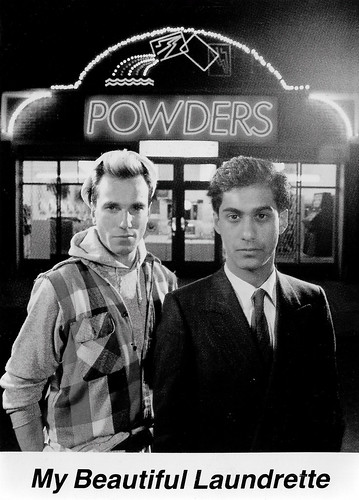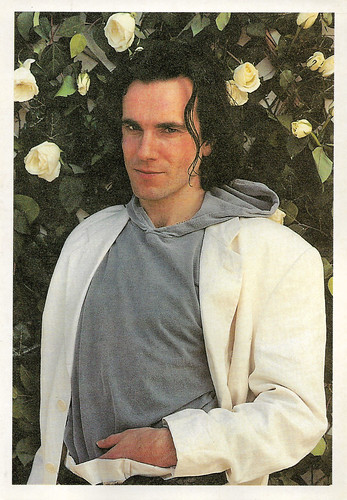
Italian postcard in the World Collection series, no. p.c. 471. Photo: Ada / Olympia. Daniel Day-Lewis in In the Name of the Father (Jim Sheridan, 1993).

British card. Photo: Daniel Day-Lewis and Gordon Warnecke in My Beautiful Laundrette (Stephen Frears, 1985).
Acting or woodworking
Sir Daniel Michael Blake Day-Lewis was born in Kensington, London, in 1957. His father was the British Poet Laureate Cecil Day-Lewis. His mother, actress Jill Bacon, came from a Jewish family and was the daughter of Sir Michael Bacon, former head of Ealing Studios.
Cecil Day-Lewis was already 53 when his son was born, and it seemed that he had little interest in his children. Cecil died when Daniel was 15. Day-Lewis later said that he regretted never having had a good relationship with his father. At his school in Greenwich, Day-Lewis was often bullied by children, often because of his Jewish heritage and the luxurious way of life at home.
Day-Lewis later said that he behaved badly in his younger years. He got into trouble several times for shoplifting and other illegal activities. In 1968, he went to a boarding school in Kent because his parents thought he was behaving too freely. Although he disliked the school, it was there that he was first introduced to two of his main interests, acting and woodworking.
Day-Lewis made his debut in Sunday Bloody Sunday (John Schlesinger, 1971). He was 14 years old at the time and played a vandal. His role is not mentioned in the credits. According to Day-Lewis, he received two dollars for that role in wrecking some expensive cars and he later said that this wrecking felt like "heaven". After two years at boarding school, he attended Bedalas School in Petersfield. He left the school in 1975. His behaviour had improved somewhat by then.
Day-Lewis arrived at a time when he had to choose in which direction he wanted to go, acting or woodworking. He decided to act, but he was not accepted because he had too little experience. That is why he chose acting. He followed a three-year course at the Bristol Old Vic theatre school. He then acted on stage with the Bristol Old Vic and Royal Shakespeare Companies. He made his West End stage debut in 1982, starring for several months in the play 'Another Country'.

Danish postcard by Forlaget "Holger Danske", no. 609. Daniel Day-Lewis in My Beautiful Laundrette (Stephen Frears, 1985).
Chameleon-like versatility
In 1982, Daniel Day-Lewis had another small role in a major film, this time as the bully in Gandhi (Richard Attenborough, 1982). Later, he also starred in a 'Romeo and Juliet' play and had a supporting role in the film The Bounty (Roger Donaldson, 1984), starring Mel Gibson and Anthony Hopkins. His next theatre role was in 'The Count', a play about Dracula. In My Beautiful Laundrette (Stephen Frears, 1985), he played a lower-class, gay ex-skinhead in love with an ambitious Pakistani businessman (Gordon Warnecke) in Margaret Thatcher's London. His next film, A Room with a View (James Ivory, 1985) was again very well received. In that film, he played the fiancée of the main character played by Helena Bonham Carter.
My Beautiful Laundrette and A Room With a View opened on the same day in New York. Day-Lewis astonished critics and audiences with his chameleon-like versatility. The New York Film Critics Circle took particular note of his talent, naming him the year's Best Supporting Actor for his work in both films. In 1987, Day-Lewis starred in Milan Kundera's The Unbearable Lightness of Being (Philip Kaufman, 1987), along with Lena Olin and Juliette Binoche. Day-Lewis played the role of a philandering surgeon from Prague, who gets into an emotional relationship with a woman for the first time.
In 1989, Day-Lewis did a brilliant performance as the disabled Irish writer Christy Brown in the film My Left Foot (Jim Sheridan, 1989). He won several awards for this role, including an Academy Award for Best Actor. During filming, Day-Lewis broke two ribs after an accident with the wheelchair in which his character always sat. After several films, Daniel Day-Lewis returned to the stage for Shakespeare's play 'Hamlet'. He collapsed on stage, however, when (supposedly) the ghost of Hamlet's father came on stage. Day-Lewis later said that he mistook him for his father's ghost. After this incident, Day-Lewis never returned to the stage. In 1992, three years after he won an Oscar, Day-Lewis starred in The Last of the Mohicans (Michael Mann, 1992), a film that met with mixed reviews but was a great success at the box office.
He played a late-19th-century New York society man in Martin Scorsese's lavish adaptation of Edith Wharton's The Age of Innocence (Martin Scorsese, 1993) opposite Michelle Pfeiffer and Winona Ryder. Another success was In the Name of the Father (Jim Sheridan, 1993). For his role as an innocent convict of an IRA bombing, he lost a lot of weight and had to act with an Irish accent. According to Day-Lewis, he frequently urged crew members to throw cold water on him and use verbal abuse against him so that his anger, which his character must have in circumstances such as the film, would become more realistic. Day-Lewis was again nominated for an Oscar for Best Actor for his role. He was also nominated for a BAFTA for the third time and a Golden Globe for the second time.
Next, he starred as the tragically adulterous John Proctor alongside Winona Ryder in The Crucible (Nicholas Hytner, 1996). The film was based on a script by Arthur Miller, who would become Day-Lewis' father-in-law. He then had a role in Jim Sheridan's The Boxer (1997), as a former boxer trying to make a new life for himself after being imprisoned for fourteen years for his work with the IRA. He had to prepare for that role as well, training for six months in boxing with former world boxing champion Barry McGuigan.

Spanish postcard in the Collección "Estrellas cinematográficas" Cacitel, no. 77.
Focus on his old passion
Daniel Day-Lewis took a break for several years. He decided to focus on his old passion: woodworking. He moved to Florence in Italy. It was not until 2002 that another of his films premiered, Gangs of New York (Martin Scorsese, 2002) with Leonardo DiCaprio and Cameron Diaz. Day-Lewis' decidedly methodic approach to creating convincing screen characters would ultimately pay off as many cited his Oscar-nominated performance as one of the most convincing of the talented actor's career.
Day-Lewis typically disappeared from sight yet again after Gangs, waiting two years before appearing again in a film. In 2005, The Ballad of Jack and Rose premiered. This film was directed by his own wife, Rebecca Miller. Day-Lewis played the role of an old man who is dying and reflects on his life. During filming, he lived apart from his wife to make his role as a lonely old man even more believable.
His next film was based on Upton Sinclair's novel 'Oil!'. The film was renamed There Will Be Blood (Paul Thomas Anderson, 2007) and Day-Lewis won the Best Actor Oscar for his role in that film. In 2009, Day-Lewis starred in Rob Marshall's musical adaptation Nine (2009) as film director Guido Contini. In 2013, he won his third Oscar for his portrayal of Abraham Lincoln in Lincoln (Steven Spielberg, 2013) with Sally Field.
Daniel Day-Lewis is the only person in film history to have won the Oscar for Best Male Lead three times. In 2014, he received a knighthood for his services to drama. Following the filming of Phantom Thread (Paul Thomas Anderson, 2017), for which he was again nominated for an Oscar for best male lead, Day-Lewis announced that he was quitting acting. Day-Lewis is very protective of his privacy. He rarely reveals his private life in public.
In 1996, while working on the film The Crucible, Daniel Day-Lewis went to visit the writer of the script, Arthur Miller. During that visit, he fell in love with Miller's daughter, Rebecca Miller. They were married two weeks before the premiere of The Crucible. They have two sons together, Ronan (born in 1998) and Cashel (2002). They spend their time together in their homes in the United States and Ireland. Daniel Day-Lewis was in a relationship with Isabelle Adjani from 1989 to 1994. They have one son together, Gabriel-Kane Day-Lewis (born 1995). Daniel Day-Lewis has dual citizenship between the United Kingdom and Ireland.

Canadian postcard by Canadian Postcard, no. A-251. Daniel Day-Lewis in In the Name of the Father (Jim Sheridan, 1993).
Sources: Rebecca Flint Marx (AllMovie), Pedro Borges (IMDb), Wikipedia (Dutch) and IMDb.
This post was last updated on 4 January 2024.
No comments:
Post a Comment